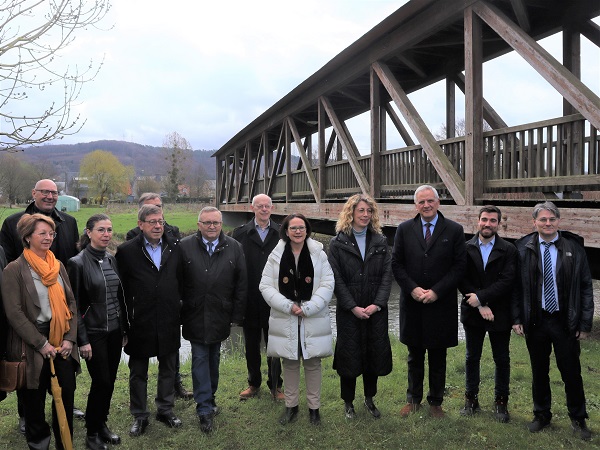 Credit: MECDD
Credit: MECDD
The European Investment Bank (EIB) has granted a €9 million loan to finance the ecological restoration of the Alzette river network in Luxembourg.
Last week, Luxembourg's Minister of Finance, Yuriko Backes, the Minister for the Environment, Climate and Sustainable Development, Joëlle Welfring, and the Vice-President of the EIB, Kris Peeters, presented a financing agreement between Luxembourg and the EIB to fund the ecological restoration of the Alzette river and its tributary, the Pétrusse.
The works will cover a section of the Alzette located in Steinsel and a section of the Pétrusse located in Luxembourg City.
The project has received an EIB loan for €9 million, granted under the Natural Capital Financing Facility (NCFF), which is part of the European Union's (EU) LIFE programme.
On a visit to Steinsel, participants viewed a portion of the river that had already been restored in order to form an idea of the final outcome. Coordinated by Luxembourg's Ministry for the Environment, Climate and Sustainable Development and its Water Management Authority, the project is part of a larger long-term programme to restore the Alzette river network from Luxembourg City to Mersch.
The restoration works for the Pétrusse are also part of a large-scale ecological restoration of the Pétrusse valley, intended to revitalise its damaged and altered ecosystems. Through this project, which will be completed in several phases, heavily urbanised sections of river are expected to resume a more natural course. Their banks will also be restored to create natural habitats for flora and fauna. Planting riverside vegetation and allowing plant life to thrive on the banks will serve to create an ecological corridor. The restoration is expected to let the water flow more naturally and slowly, reducing the risk of flooding.
The project will also serve to reconnect the Pétrusse with the Alzette by creating a softer incline at the river junction and adding a crossway for fish.
The ecological restoration programme is based on an in-depth study of the natural changes and man-made developments in the Alzette river valley and is being carried out in close collaboration with the local authorities.
The project is part of the NCFF under the EU's LIFE programme, which supports projects devoted to biodiversity and/or nature-based adaptation to climate change.
"Today, I am proud to be able to add this agreement to our portfolio of fruitful cooperation with the EIB. Having the financial support of government and local authorities, and of the multilateral community, is essential in order to promote the investments we need to protect the environment," remarked Minister Backes. "Not only will the works to be financed restore the natural balance of the Alzette [...] but they will ultimately provide opportunities for climate change mitigation and sustainable economic development in the region."
Minister Welfring added: "This project is a perfect example of what it takes to face the impact of climate change. This ecological restoration will provide better protection against flooding, while the restored wetland areas will also continue to feed into our water tables and riverways, reducing the impact of drought. At the same time, renaturation fosters biodiversity by recreating ecological webs and improving water quality using natural means."
For his part, EIB Vice-president Kris Peeters noted: "We are pleased to be a part of these investments with strong environmental and climate facets. Their impact will soon be measurable in these ecosystems by the return of biodiversity, and is essential for people living nearby, who will enjoy greater flood risk protection - a 'win-win' situation for the environment and inhabitants."








